Burgate Surname Ancestry ResultsOur indexes 1000-1999 include entries for the spelling 'burgate'. In the period you have requested, we have the following 25 records (displaying 1 to 10): Buy all | | | Get all 25 records to view, to save and print for £98.00 |
These sample scans are from the original record. You will get scans of the full pages or articles where the surname you searched for has been found. Your web browser may prevent the sample windows from opening; in this case please change your browser settings to allow pop-up windows from this site. Curia Regis Rolls
(1194-1199)
The Curia Regis, king's court, of mediaeval England took cases from throughout the country, and its records are among the most important surviving from this early period. This transcript of the rolls for October to December 1194 and October 1198 to July 1199 were edited by sir Francis Palgrave for the Commissioners of the Public Records. Most entries have the name of the county in the lefthand margin.BURGATE. Cost: £4.00.  | Sample scan, click to enlarge
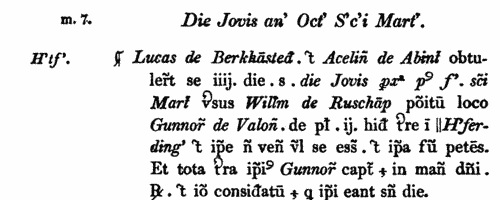
| Oblata or Fine Rolls
(1200-1216)
All the surviving oblata or fine rolls of the reign of king John were edited by Thomas Duffus Hardy and printed by the Commissioners of the Public Records in 1835. These are the oblata rolls of the 1st, 2nd and 3rd years of the reign, and the fine rolls of the 6th, 7th, 9th, 15th, 16th and 17th years. These rolls contain notices of the oblations or fines offered to the Crown to procure grants and confirmations of liberties and franchises of markets, fairs, parks and free warren; for exemption from tolls, pontage, passage and murage; to obtain justice and right; to stop, delay or expedite pleas, trials and judgments; and to remove suits and processes from inferior tribunals into the King's Court. Fines were also extracted for licence to trade, or permission to exercise commerce or industry of any kind, and to have the aid, protection, or goodwill of the King; to mitigate his anger or abate his displeasure; to be exempted from knighthood either for a term or for ever, and from attending the King in his foreign expeditions; they were also demanded for seisin or restitution of ancestral lands or chattels; for allowing delinquents to be replevied or bailed; for acquittal of murder; and for pardon of trespasses and misdemeanours; for the 'year and a day' of the lands and goods of felons and fugitives. Almost all entries have the county in question indicated in the left hand margin.BURGATE. Cost: £4.00.  | Sample scan, click to enlarge

| Curia Regis Rolls
(1219-1220)
The Curia Regis, king's court, of mediaeval England took cases from throughout the country, and its records are among the most important surviving from this early period. Rolls 71 and 71B for Michaelmas term of the 3rd and 4th years, and 72 and 73 for Hilary term and Easter term of the 4th year of the reign of king Henry III (Michaelmas 1219 to Easter 1220) were edited by C. T. Flower of the Public Record Office and published in 1938. Each entry is copied in full, the Latin extended from the abbreviated original, the personal and place names given as in the original; where these vary between duplicate rolls, variant spellings are given in the footnotes. The county of each case was marked in the margin in the originals, and this is shown in italics at the start of each entry in the printed edition. BURGATE. Cost: £4.00.  | Sample scan, click to enlarge

| Pipe Roll
(1241-1242)
The Great Rolls of the Pipe are the central record of the crown compiling returns of income and expenditure from the sheriffs and farmers of the various English counties or shires. This is the oldest series of public records, and the earliest surviving instances of many surnames are found in the Pipe Rolls. This is the roll for the 26th year of the reign of king Henry III, that is, accounting for the year from Michaelmas 1241 to Michaelmas 1242. Most (but not all) of the entries in which names appear relate to payments for grants of land and fines or pardons arising from the proceedings of the justices. The text was edited by Henry Lewin Cannon for Yale Historical Publications and printed in 1918. The name of the county is given at the head of each page, and variant spellings, omissions and additions found in the duplicate Chancellor's Roll [C. R.] are given in the footnotes.BURGATE. Cost: £4.00.  | Sample scan, click to enlarge
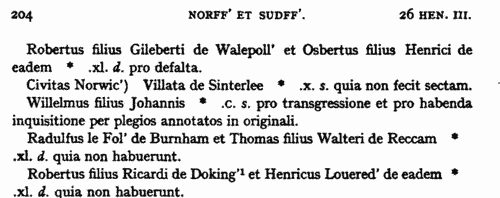
| Liberate Rolls
(1251-1260)
These chancery liberate rolls of the 36th to 44th years of the reign of Henry III of England record the details of payments and allowances as part of the administration of government. Most entries start with the Latin words 'liberate', meaning 'deliver', or 'allocate', meaning allow. There are also 'contrabreves', warrants mainly to sheriffs of shires, assigning them tasks and allowing expenses. Most of the entries relate to England and Wales, but there are occasional references to Ireland and the English possessions in France.BURGATE. Cost: £4.00.  | Sample scan, click to enlarge
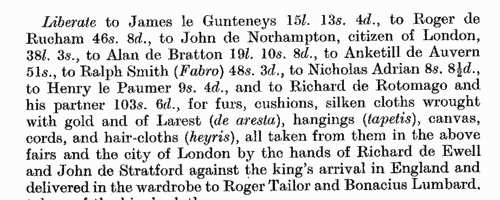
| Worcestershire Inhabitants
(1280)
The Worcestershire Lay Subsidy roll of about 1280 lists lay inhabitants of each township of the shire and of each ward of the city of Worcester, with the amount of tax payable by each. Latin.BURGATE. Cost: £4.00.  | Sample scan, click to enlarge
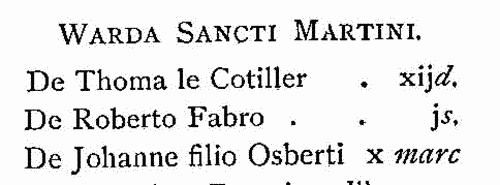
| Yorkshire Inquisitions
(1241-1283)
Inquisitions post mortem are inquiries as to the real estate and heir of each person holding in capite or in chief, i. e. directly, from the Crown, or whose estates had been escheated or were in ward. The age and relationship of the heir are usually recorded. Inquisitions ad quod damnum enquired as to any activities (including maladministration by local officials) that had resulted in any material loss to the Crown. Both sets of inquisitions for this period were edited by William Brown for the Yorkshire Archaeological and Topographical Association, and printed in 1891. This index covers all names mentioned, including jurors, tenants, &c. BURGATE. Cost: £4.00.  | Sample scan, click to enlarge
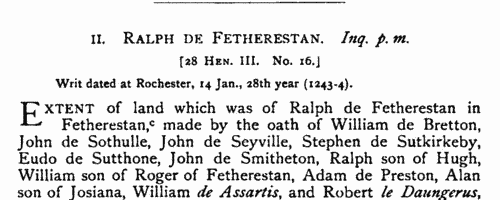
| Guisborough Cartulary
(1119-1300)
The Augustinian (black canons) priory of the Blessed Virgin Mary at Guisborough (Gyseburne) near Middlesbrough in north Yorkshire, was founded about 1119 by Robert de Brus. The 1100 or so grants of land (mostly in Cleveland) made to the priory from then well into the 13th century were copied into a cartulary or chartulary which survives as Cottonian Manuscript Cleopatra d ii (British Library). This was edited by W. Brown and published by the Surtees Society from 1889. This second part contains the charters numbered DXCIV to MCLXXXIX. The texts have been stripped of repetitious legal formulae, retaining the details of the grantors, the property, and the witnesses: so the individuals named are mainly local landowners and tenants, canons, servants and wellwishers of the monastery. The charters before 1250 are often undated. The charters in this section are arranged by place, under the heads 'Normanby; Martona; Thornaby; Ugthorpe et Pecibiggyng; Levingtona; Jarum; Castle Levington; Kepwyck; Feyceby; Atona; Thresk; Neuton; Estona; Lackenby; Lyum; Cotum; Scheltona; Brottona; Moresom; Glasedale Daneby et Moresum; Kylton; Lofthus; Esingtona; Lyverton; Daneby; Glasdale; Uggethorpe; Percybyggyng; Sletholme; Scalynge; Redker; Merske; Hesele; Lunde super le Walde; Kirkburn; Rotsea; Bainton; Tibthorpe; Ingleby Arncliff; East Harlsey; Sawcock; Scarth; Stokesley; Kirkby-in-Cleveland; Battersby; Stainton-in-Cleveland; Maltby; Ayresome; York; Sinnington; Barningham and Newsham; Aylesby; Kelsterne; Bridekirk and Appleton; Aislaby; Hart and Hartlepool; Castle Eden; and Annandale'. Three further sections are added from other sources: 1. Documents connected with the burning of the priory church in 1289; 2. Extracts from the registers of the archbishops of York relating to the priory, 1238 to 1337; 3. A rent roll of the priory of about 1300 (pp. 412 to 450), giving many names of tenants.BURGATE. Cost: £4.00.  | Sample scan, click to enlarge
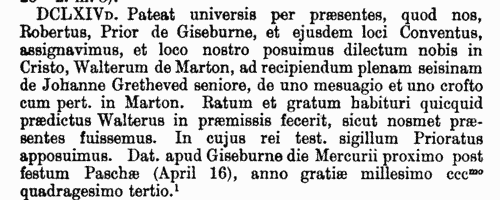
| Norfolk Feet of Fines
(1196-1307)
Pedes Finium - law suits, or pretended suits, putting on record the ownership of land in Norfolk. These abstracts were prepared by Walter Rye.BURGATE. Cost: £4.00.  | Sample scan, click to enlarge

| Grantees of offices, commissions and pardons
(1317-1321)
The Patent Rolls are the Chancery enrolments of royal letters patent. Those for the 11th to the 14th years of the reign of king Edward II (8 July 1317 to 7 July 1321) were edited for the Public Record Office by G. F. Handcock, and published in 1903. The main contents are royal commissions and grants; ratifications of ecclesiastical estates; writs of aid to royal servants and purveyors; and pardons. Most extensive are the commissions of oyer and terminer to justices to investigate complaints about specific crimes and wrongs in particular counties.BURGATE. Cost: £2.00.  | Sample scan, click to enlarge

|
Research your ancestry, family history, genealogy and one-name study by direct access to original records and archives indexed by surname.
|












